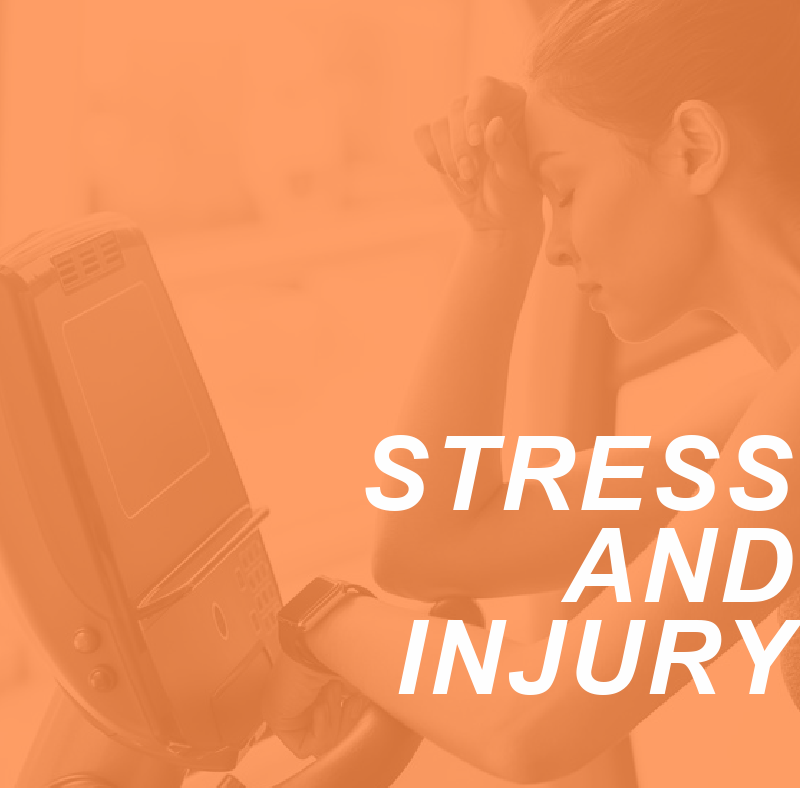
As trainers, our clients will often share with us details about their lives outside of the time we are training together including stress surrounding home life, work, relationships, or as parents. Research has shown that there is a link between stress and injury, and there are several warning signs we can look out for to help ensure we don’t add injury to our clients’ stress. While we are not qualified to offer mental health advice, it is important to understand when our clients are under a great deal of stress as it could impact their ability to train safely.
Effects of Stress on the Body
Any intrinsic or extrinsic stimulus that evokes a biological response is known as stress, and it has an effect on every system in the body. Brain function and memory, the immune system, cardiovascular system, gastrointestinal and endocrine systems are all affected by stress.
In training and considering the potential for injury, it is mostly the musculoskeletal system that concerns us as fitness professionals. Muscular tension is a natural reflex and a reaction to stress. Often, the muscles will release tension once stress passes. But in cases of chronic stress, the muscles remain tense for longer periods of time and can contribute to other reactions in the body like headaches or muscular pain.
How Stress and Injury Interplay
Beyond increased muscular tension, stress can affect other aspects of our clients’ lives and wellbeing.
Those who are under a great deal of stress may also have trouble sleeping. Adding exercise to a busy schedule, without having enough sleep, can be injurious. If we know our clients have been stressed at work or at home, we can encourage them to get more sleep and avoid exercises like heavy weights or machines like the stair stepper or treadmill if we know they are overtired.
Being stressed and tired can also limit a person’s ability to concentrate or focus on what they are doing. As trainers, we will need to pay special attention to form and keep our clients engaged throughout the session.
Benefits of Stress
While stress can have negative effects on the body, there are some benefits to a moderate amount of stress.
Though chronic stress can make it difficult to concentrate, moderate or positive stress, known as eustress, actually increases alertness and performance. When stress is short-lived and feels manageable, it can improve cognitive performance and memory.
Each person’s response to stress is different and research has shown that people who feel resilient and confident that they can manage stress are much less likely to be overwhelmed by it—and are more likely to have a healthy response— compared to people who think of stress as bad.
Exercise for Stress Management
For those who are seeking information on how to better manage stress, some form of exercise is almost always recommended. Any form of exercise, from yoga to aerobics, can serve as a stress reliever.
Exercise mimics the effects of stress encouraging the body and its systems to manage those effects cooperatively. It can also protect the body and its systems against the negative effects of stress.
Additionally, exercise can improve mood, boost confidence and help with sleep. All of these things can help reduce symptoms of stress and make stressors feel more manageable.
Supporting Your Clients
Some may choose to work with us because they are looking to relieve stress through exercise and, of course, we know that is possible. Knowing that it is also possible that their stress could have the potential for injury, we can pay close attention to our clients and design programs that may reduce that potential.
As personal trainers, we are invited into our clients’ circle of social support and we can be there to support and encourage them on their fitness journey which may also support them in their daily lives.
References
www.psychology.iresearchnet.com/health-psychology-research/psychophysiology/psychological-susceptibility-to-injury/
https://www.apa.org/topics/stress/body
https://www.ncbi.nlm.nih.gov/pmc/articles/PMC5579396/
https://greatergood.berkeley.edu/article/item/the_surprising_benefits_of_stress
https://www.ncbi.nlm.nih.gov/pmc/articles/PMC2921311/







